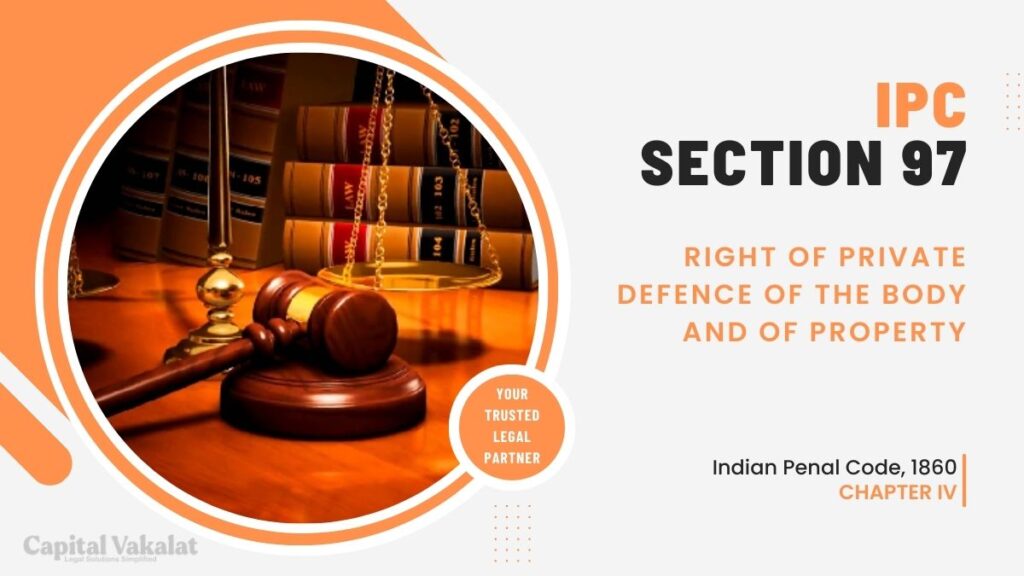In the realm of criminal law, understanding one’s rights and obligations is of paramount importance. Section 97 of the Indian Penal Code (IPC) delves into the concept of the right of private defence of the body and of property. This legal provision empowers individuals to protect themselves and their possessions in specific situations.

In this comprehensive article, we will explore the intricacies of Section 97 IPC, shedding light on its applicability, limitations, and real-life scenarios. Let’s embark on this legal journey to gain a deeper understanding of this crucial aspect of Indian criminal law.
Introduction to Section 97 IPC
Section 97 of the IPC is a legal provision that grants individuals the right to defend themselves and their property against unlawful aggression. It recognizes that every person has a natural instinct to protect themselves and their belongings from harm. However, this right is not without limitations and must be exercised judiciously.
The Right to Defend One’s Body
2.1. Imminent Threat
The right of private defence of the body comes into play when an individual reasonably believes that there is an imminent threat to their life or physical integrity. This threat could be from another person, a wild animal, or even a dangerous object.
2.2. Degree of Force
While defending oneself, it is crucial to use a degree of force that is proportionate to the threat faced. Excessive force that goes beyond what is necessary for protection may lead to legal consequences.
2.3. Retreat as an Option
In some situations, the law expects individuals to retreat and avoid a confrontation if it is possible to do so safely. The right to use force in self-defence is not absolute and may be subject to the duty to retreat.
Defending Property under Section 97
3.1. Ownership and Possession
To invoke the right of private defence of property, one must establish their ownership or lawful possession of the property in question. This ensures that the defence is only used to protect one’s legitimate interests.
3.2. Reasonable Force
Similar to defending one’s body, defending property also requires the use of reasonable force. Excessive force that causes harm beyond what is necessary to protect the property is not permitted.
3.3. Preventing Trespass
Section 97 allows individuals to use force to prevent trespass or theft, but the force used must be proportionate to the threat posed by the trespasser.
Limitations on the Right of Private Defence
4.1. Proportionality
A fundamental principle of the right of private defence is proportionality. Any force used must be directly proportionate to the threat faced. Disproportionate force can lead to legal consequences.
4.2. No Excessive Force
Excessive force is strictly prohibited. Using more force than necessary to repel an attack or protect property is not covered by the right of private defence.
4.3. No Revenge or Vendetta
It’s essential to note that the right of private defence cannot be used as a pretext for revenge or vendetta. It should only be invoked when there is a genuine threat to life or property.
Notable Cases Involving Section 97 IPC
Over the years, several legal cases have revolved around the application of Section 97 IPC. These cases serve as precedents and provide valuable insights into the nuances of this legal provision. Some notable cases include [List of notable cases].
Conclusion
In conclusion, Section 97 of the Indian Penal Code is a vital legal provision that safeguards an individual’s right to defend their body and property. However, it is crucial to exercise this right judiciously, keeping in mind the principles of proportionality and reasonableness. By understanding the intricacies of Section 97 IPC, individuals can navigate situations involving self-defence and property protection more effectively.
FAQs
Can the right of private defence be invoked in cases of verbal threats?
No, the right of private defence typically applies when there is a reasonable belief of an imminent physical threat.
Are there any legal consequences for using excessive force in self-defence?
Yes, using excessive force can lead to legal consequences, as it goes beyond the principle of proportionality.
Does Section 97 IPC apply to the protection of public property?
Section 97 IPC primarily pertains to the protection of private property, although there are other legal provisions for the protection of public property.
How can one determine if the use of force in self-defence was reasonable?
The reasonableness of the use of force in self-defence is assessed based on the circumstances and the perceived threat at the time of the incident. It is a subjective assessment made by the courts.